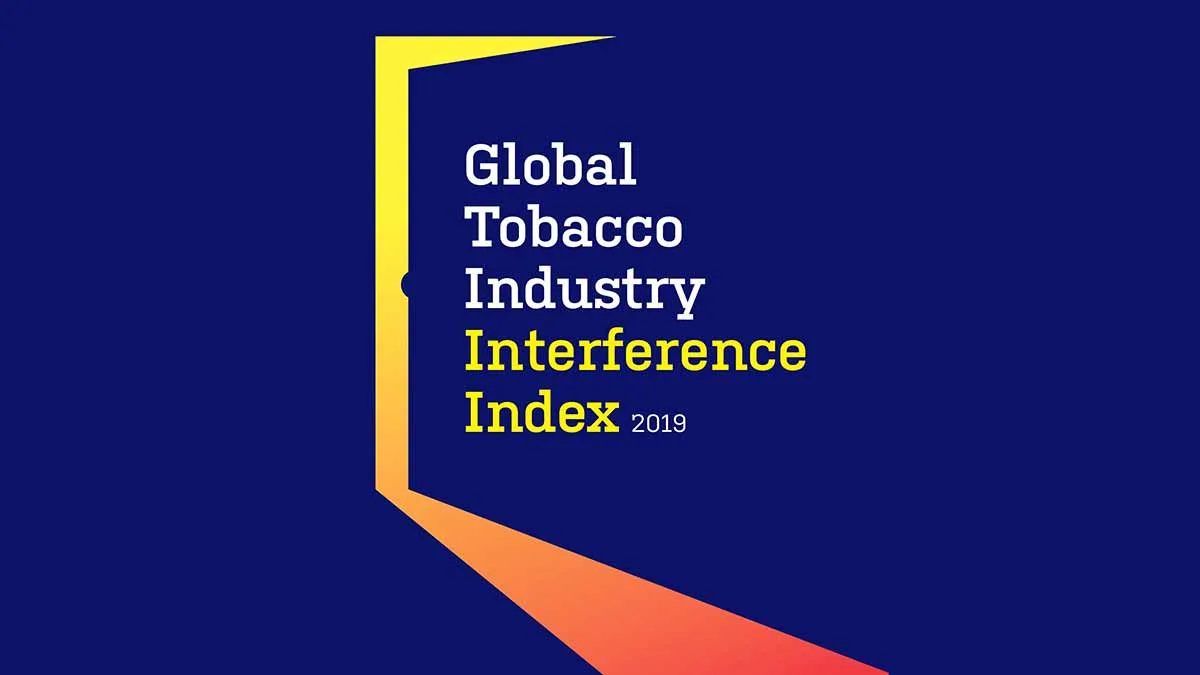- Resources
- News
-
-
Get Email Updates
Sign up for STOP's emails and never miss an update on our latest work and the tobacco industry's activity.
-
Get Funding
Ready to tackle industry interference? You could be eligible for a grant.
-
Share a Tip
Do you have information on tobacco industry misconduct in your country? Let us know.
-
Get Email Updates
Sabotaging Policy
October 09, 2019

Bangkok, Thailand (10 October, 2019) — The first-ever global index on tobacco industry meddling in health policy is published today by STOP (Stopping Tobacco Organizations and Products), a global tobacco industry watchdog. Japan, Jordan, Egypt and Bangladesh scored the highest in the level of influence they allow, while the United Kingdom, Uganda and Iran emerged as leaders in protecting health policy from industry meddling.
Key Global Findings
The Global Tobacco Industry Interference Index ranks countries, on a scale of 0 to 100, with higher scores showing more industry meddling. Countries are ranked on overall interference and on specific metrics such as interference in policy development. Key findings include:
Transparency Matters
Countries fared better when they were more open about their dealings with the industry, including recorded interactions and political donations. Political contributions and gifts from the tobacco industry are banned in Brazil, Canada, France, Iran, Myanmar, Turkey, U.K., Uganda and Uruguay. Among the countries surveyed, transparency on political contributions is required only in Kenya and the U.S.
Wooing of Senior Officials was rampant across regions
Tobacco companies aggressively targeted departments of Finance, Commerce and Trade to achieve policy influence. They used donations and awards to obtain endorsement from senior officials.
E-cigarettes pose a new threat
There is growing evidence of the industry using harm reduction claims about e-cigarettes to justify interactions with government officials and open the door to new products. In 2018, tobacco companies lobbied to make it easier for them to sell or promote e-cigarettes in the United States, Philippines, Mexico, Lebanon and Turkey.
Tax breaks benefitted industry in many countries
Incentives, exemptions and duty-free tobacco boost production and sales in markets that may have other regulations in place. Only Sri Lanka bans duty-free sales of cigarettes.
Any country can succeed
The UK, Uganda, and Iran are economically, politically and culturally diverse countries and the most successful in resisting industry influence. They prove that any country can have good measures to prevent tobacco companies from having undue influence on health.
“This report shows that the tobacco industry is as underhanded as ever. It may claim that it is changing in public, but behind the scenes it is fighting tooth and nail to sabotage effective regulation. Governments must stand firm and fulfil their mandate to protect public health,” said Mary Assunta, lead author of the Index, Head of Global Research and Advocacy at GGTC and a partner in STOP.
“Seven national governments completely exclude the tobacco industry in establishing and implementing tobacco control policy,” said Sandra Mullin, Senior Vice President at Vital Strategies and Board Chair of STOP “This is why those countries have some of the lowest levels of interference recorded. Our report suggests that even these countries need to be vigilant against new industry tactics. You simply cannot create healthier, smoke-free environments with tobacco companies involved in the policy process.”
About The Global Tobacco Industry Interference Index
The Global Tobacco Industry Interference Index covers 33 countries and is based on publicly available information on tobacco industry interference in these countries and their respective governments’ responses to incidences of interferences for the period of January 2017 to December 2018. The 33 countries are ranked according to total scores provided by civil society groups who prepared their respective country reports. The lower the score, the lower the overall level of interference, which bodes well for the country.
The Global Index, which GGTC and STOP will update annually, scores each country on how well it controls:
• The industry’s level of participation in policy development
• Corporate social responsibility activities
• Benefits to the tobacco industry
• Forms of unnecessary government-industry interaction
• Transparency
• Conflicts of interest
• Measures that prevent industry influence.
The Global Index provides eight recommendations for governments to improve how they can protect their policies from industry meddling, including avoiding situations of conflict of interest, being transparent when dealing with the tobacco industry, firewalling government officials through proper rules of engagement with the industry, and increasing awareness across government agencies about industry tactics.
To read the full global report, please visit https://exposetobacco.org/global-index/. To explore the data and national level reports, please visit http://globaltobaccoindex.org/.
About STOP (Stopping Tobacco Organizations and Products)
STOP is a global tobacco industry watchdog whose mission is to expose the tobacco industry strategies and tactics that undermine public health. STOP is funded by Bloomberg Philanthropies and comprised of a partnership between The Tobacco Control Research Group at the University of Bath, The Global Center for Good Governance in Tobacco Control (GGTC), The Union and Vital Strategies. For more information, visit exposetobacco.org.


